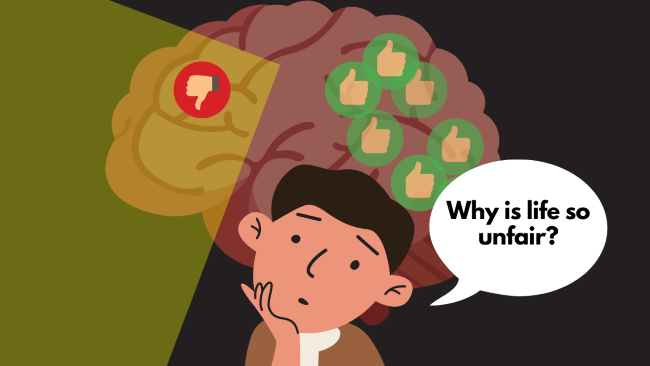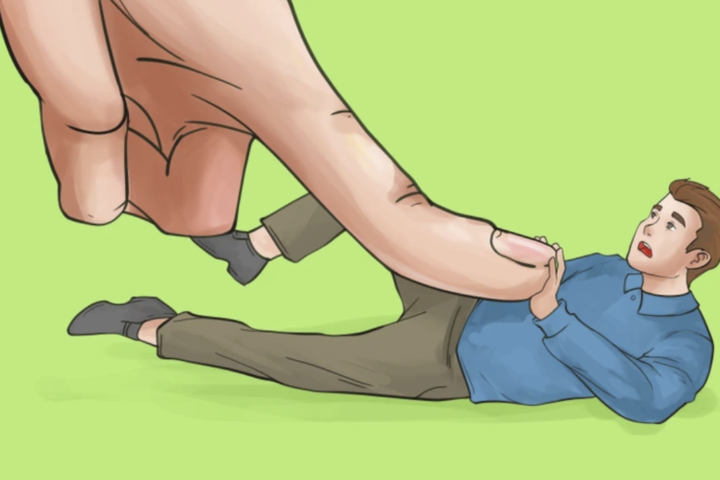The pain of being bullied or made fun of by friends or other people feels more imprinted than the pleasure of being complimented. Have you ever feel why do you remember negative memories more than the positive memories?
This is actually a phenomenon in the science of human behavior called “Negative Bias”. In fact, our mind remember more sensitively and triggered more from the negative memories.
The Scientific Finding
So in a series of studies on human behavior, a rather grim fact is revealed. Negative moments are easier for the human mind to remember, and also last longer than positive moments or events.
The term is: bad is stronger than good.
Hence, the bad events that trigger negative emotions are stronger in our minds as humans, than good or positive events.
For example: the pain of being bullied or made fun of by friends or other people feels more imprinted than the pleasure of being complimented. The event of breaking up with an ex will last longer in the memory.
Other example: news and information that trigger negative emotions such as anger will more easily spread to go viral.
A study also found a fact: the event of a losing a money of $1 Million (negative event) will be much more imprinted in the mind rather than when the incident of receiving a bonus of $1 Million (positive event).
And why do the majority of news in various online media report more negative news (such as conflicts, riots, accidents, etc.)? Simple. Because bad news is more sellable.
Negativity Bias
In short, based on a series of scientific researches, the human mind turns out to be more sensitive to bad memories. Events that trigger our negative emotions will be far more imprinted on our minds, compared to various events that elicit positive emotions.
The phenomenon of bad is stronger than good is also in line with another phenomenon in the science of human behavior which is called “negativity bias”. Researchers in the behavior sciences have long discovered the phenomenon of this negative bias, and its impact on human perception and behavior.
The meaning of negativity bias is the human tendency to focus more on negative things. Or, also instinctively it is easier to see various shortcomings and bad things around them.
This negativity bias often makes it easier and faster for someone to see the ugliness of other people or the things around them. Rather than seeing the positive things that exist in other people or things around them.
We Remember Negative Memories More From The Brain’s Nerve Cells
Neurological experts say that the phenomenon of bad is stronger than good and the phenomenon of negativity bias stems from the same root. It turn out that the composition of the human brain’s nerve cells, by default is indeed more sensitive and easier to react to negative things.
Inevitably, the phenomenon of bad is strong than good and this negativity bias poses a big challenge to the process of achieving mental happiness. Why? Because when our minds focus more on negative things around us, our souls will undoubtedly become more easily upset.
When every day we are more sensitive and easily triggered by various negative things, our souls will never be happy.
What We Should do to Get Rid of Negative Bias?
So what must be done so that we can get out of this negative bias trap? Because once again, the trap of negativity bias will make it harder for us to knit a happy soul. And then, when our souls are not happy, it will be increasingly difficult for us to achieve the success we expect.
Realizing that there is a phenomenon negativity bias and the phenomenon of bad is stronger than good, is a valuable first step. Because this awareness will enable us as humans to understand the latent dangers that exist in our own minds.
With this kind of self-awareness, we can then knit strategies in order to help the growth of a mind that is clean from negativity bias, and for the birth of a happier soul.
Read Also: Here’s How to Transform Your Mind to Have a Positive Mindset
1. Start to train the positive thought muscles in our nerve cells.
Starting today, slowly direct your mind to discover, feel and appreciate the positive things around you.
Instead of always seeing the negative things from your work, and then complaining in your heart without stopping, focus your mind on seeing the positive side more. Find and appreciate the positive things that must always be in it.
Or instead of always seeing the negative things from your daily activities, take time to focus more on feeling and appreciating the positive things that exist.
Since we wake up, do activities, until the night when we want to sleep, there will always be many events and events that we go through. And in it, there will always be positive things – however small – that deserve our appreciation.
So far we have missed seeing these small but positive things because we have never trained our mind muscles to do them. Or because our mind muscles are always successfully hijacked to only think about the negative.
Don’t let the muscles of our positive thoughts limp, continue to be hit by the power of the muscles of negative thoughts that are increasingly powerful. Always take a moment to try to explore, discover, feel, and appreciate the positive things (however small) that are around us.
2. Periodically Do a Gratitude Habit
A number of human behavior experts have conducted many studies on the effects of grateful activities for inner peace and happiness of the soul.
And the results are amazing: the respondents who regularly perform the ritual of gratitude, it turns out that their brain nerve cells become calmer, more resilient, and more resilient in facing life’s challenges. The researchers even went so far as to say: if you want your soul to always grow positively, just do something simple and very cheap, which is to regularly perform a gratitude ritual.
Specifically, an effective gratitude ritual is like this.
So each day, you sit quietly for about 5 minutes, and then reflect on three events or three gifts or three things for which you are grateful. And then you express your deep gratitude.
This gratitude ritual is compatible with the solution above, where we must always continue to train our mind muscles to find and feel the positive things in life. Through this gratitude ritual, we train our mind muscles to see and be grateful for at least three positive things that we experience every day.
If indeed this ritual can not be done every day, at least you can do it once a week. Thus, you think about and reflect on the positive things that have happened to you over the past week. What are the positive moments that you deserve to be grateful for.
3. Change your perspective when facing a problem
In life, we will definitely encounter a number of problems (whether work problems, finances, health or family problems). When we face this problem, we are often trapped in negative bias again. This means that our minds are more obsessed with seeing the negative things that exist from the problem. We instinctively always see a problem or problem as identical with something negative, and detrimental.
That’s not the case though. Behind every problem that arises, there must always be a valuable lesson behind it. Or behind the existing problems, there will always be a way out as a solution. And not infrequently in the process of trying to find this solution, we are actually trained to become stronger and more creative individuals.
Seeing life’s problems from a negative perspective will make us focus more on difficulties, worries and complaints that make the heart sadder.
Seeing the problem from a positive perspective, will make us more focused on the solution, and help us undergo a valuable learning process for the growth of mental maturity.









